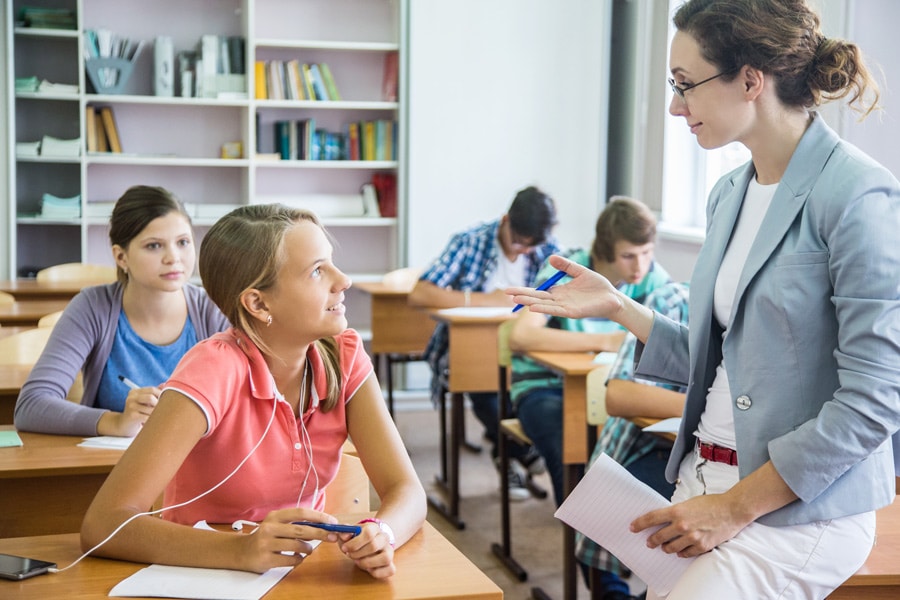Lions Quest: Promoting social and emotional learning in the classroom
In recent years, research has shown that students’ well-being and academic achievement are promoted in a classroom that supports a positive atmosphere and constructive interactions. This is one of the key principles of the positive psychology movement. Teachers, who spend the most time with students at school in the classroom, are crucial to developing an engaging and supportive learning environment. Social and emotional learning (SEL) is instrumental in creating the appropriate surroundings and fostering good relationships between teachers and students.
Social and emotional learning
SEL is an all-encompassing approach to promoting positive life development. It helps students develop the skills to create good relationships with themselves and with others. To enable teachers to support this development, they themselves need to have good social and emotional competence to be able to interact with students in a supportive and respectful way. After all, if students are to take on board the importance of respect for others and for themselves, then this must be reflected in the way their teachers interact with them. Currently, however, core teacher training around the world rarely includes any SEL elements. There are a number of additional programmes offered as part of continuing professional development (CPD) that do offer training in SEL (https://casel.org/), but little research has been done into how teachers benefit from this training.

Lions Quest
Lions Quest (LQ) is an international SEL programme that is available today in over 105 countries and has been running over 30 years. Over 18 million students have participated in LQ, with more than half a million teachers implementing LQ in their classrooms. Teachers are required to participate in the LQ teacher workshops that provide the tools necessary to implement LQ in classrooms. In addition to promoting SEL skills in the classroom, LQ promotes the creation of a safe learning environment.
Originally developed to prevent drug and alcohol abuse, it was found that life skills such as social interaction not only help prevent substance abuse but also develop healthy and capable adults. Although one of the goals of LQ is still substance awareness, life skills are seen as important in their own right, not only as tools to prevent drug use. There is a strong anti-bullying message behind the programme, as well as an emphasis on connection to school, positive behaviour, character development and service-learning. These are all important elements in the development of a flourishing classroom.
Teachers are crucial to developing an engaging and supportive learning environment.
In order to learn more about how teachers are implementing LQ in other countries and to improve training resources, Lions Quest International commissioned a study to examine implementation of LQ and teacher training in several countries. Dr Markus Talvio, principal researcher for the project, and Professor Kirsti Lonka, research supervisor, used this research to develop a protocol to enhance teachers’ professional development and competencies in SEL. They collected data from nine countries to evaluate how teachers’ thinking changed during SEL training and to assess whether the effects of the training lasted over time.
The overall aim of the research was principally to clarify the benefits of the LQ workshops for teachers, and to use the findings to improve teacher training for LQ internationally. This will ensure that the programme is optimally implemented to better support young people.

In addition to investigating the effectiveness of LQ workshops, the researchers also looked at Gordon’s Teacher Effectiveness Training (TET) and evaluated the effectiveness of TET workshops. Thomas Gordon has been central to interventions aiming to foster positive interactions in the classroom. Based on the humanistic psychology movement of the 1960s, Gordon’s models emphasised the importance of using individual resources and adopting a respectful attitude towards others.
Evaluating SEL training
Taking place from 2013 to 2019, the research to assess the effectiveness of LQ was conducted in three stages.
The goal of Phase I was to develop and test a training evaluation model for the International LQ Evaluation Project. The participants were teachers in Finland. The results from this phase showed that participating teachers rated the LQ goals as more important and relevant after receiving training and they felt more competent in skills related to LQ.
In Phase II, the development of teachers’ social and emotional intelligence was investigated. Changes in teachers’ attitudes, values, knowledge, and skills during the LQ training were explored, and data from nine countries comprising workshops from ten areas were collected. Results from Finland, Italy, Japan and Lithuania from 940 teachers in 2015–2016 showed that they perceived the LQ goals as more important after participating in the LQ teachers’ workshop. They also felt more competent in their ability to deliver LQ content in the classroom setting. Final results from further data collected from Argentina, Australia, Austria, Germany and Turkey, and longitudinal data from Japan indicate that teachers who participated in the LQ training increased their skills and knowledge and had more positive attitudes towards the LQ goals.

In Phase III of the research into the effectiveness of LQ workshops, results were disseminated and recommendations for the future have been made. The team have led seminars in participating countries, published scientific articles to share the data with professionals and undertaken scientific conference and exhibition activities. Articles in mainstream publications have also been published, to share the data with a lay audience.
The four-day TET programme was organised in two parts within a six-month period. To examine the sustainability of the studied TET skills, the teachers’ answers to the questionnaire were investigated using the Dealing with Challenging Interaction (DCI) method, which was developed to capture teachers’ styles of interaction in typical situations at work. Respondents were asked to describe in a few sentences how they would react to a challenging event, such as a confrontation with a pupil. Investigating both LQ and TET gave more rigorous and convincing information about the development of teachers’ social and emotional learning because the effects of both interventions were quite similar.
Socially and emotionally competent teachers are role models for their students.
The results of the analysis of both LQ and TET workshops showed that SEL training appeared to benefit teachers and to help them became more socially and emotionally competent. This undoubtedly has positive effects on the classroom environment. However, it was difficult to account for how cultural and language differences might have had an additional effect on the results (instead of the intervention). With the aid of local trainers and other experts, the team’s investigations were successful.
The future
It is hoped that SEL will become part of education policy globally. In Finland, SEL is already part of the new national curriculum. However, elsewhere, the pace of change is slow, as teachers need to adjust their teaching practices and to be fully on board with the theories of SEL and its benefits. Undergoing SEL training as part of teachers’ professional development may not necessarily translate into practice and there is still a lack of knowledge about how SEL is used in the classroom setting. Future research could focus on follow-up assessment of teachers who have undergone continuing teacher training in SEL at a later date. It would also be useful to assess students’ experiences and to compare those students whose teachers have participated in SEL training with students whose teachers have not. Such knowledge could be used to inform future SEL training programmes.

The results of the present studies, however, indicate that even a relatively short-term, low-cost intervention in teachers’ SEL is worthwhile. Successful SEL enables teachers and their students to face challenges and promote well-being inside and outside school more easily. Learning to collaborate and develop social and emotional skills will be increasingly important as globalisation takes hold. Teachers who have undergone SEL continuing teacher training, such as LQ workshops, are likely to be able to contribute to this learning by creating enthusiasm and enjoyment in learning and understanding the dynamics of conflicts in the classroom. Socially and emotionally competent teachers are also role models for their students, who will subconsciously learn how to recognise and manage emotions and needs, how to promote happy relationships and how to make responsible decisions in respectful ways.
Personal Response
What are the key requirements for developing SEL skills and competencies in teachers?
<> In modern educational psychology SEL provides an important approach for the development of pedagogy and overall well-being at school. Therefore, studying SEL should be the standard for all teachers and it should be studied during the early stages of initial teacher training.
Thank you. Your research is important. I recognize the challenge to transfer theory and training together with colleagues on practice in the classroom.
Have the Finish schools practiced Skills for Adolescents during Pandemia Covid19? Did you organize any research in new conditions?